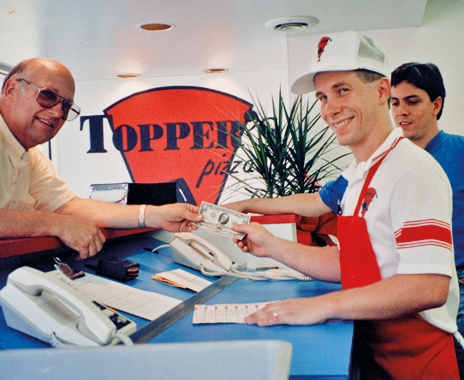Rich Hicks has reached the height of success in the restaurant industry, with his quick-service concepts being heralded with accolades and catapulting him into the spot of a top-ranked entrepreneur. And like so many other leaders in the business, his career began at the bottom, working as a dishwasher.
Now Hicks, like many other CEOs in the quick-serve space, is hoping to offer the same kind of opportunities to his employees to climb the ladder that he once had as an entry-level worker. “The industry has been very rewarding to me because I learned from the heart of the house,” says Hicks, CEO and cofounder of MOOYAH Burgers, Fries & Shakes and Tin Star.
Hicks took his first restaurant job at 15. After college, he worked his way up to general manager and then multiunit manager at a Romano’s Macaroni Grill before launching successful fast-casual taco and burger concepts. Now he’s encouraging his front-line employees to take the same path.
“We encourage that type of succession planning in growth and development,” he says. “I have numerous examples of team members that have started at the hourly level and have worked their way through the ranks and are leading as general manager.”
While the restaurant business has always been known for its upward mobility, Hicks says, fewer people today are interested in starting in entry-level jobs. That’s despite a high unemployment rate for young workers. Among 20–24-year-old workers in November 2014, the Bureau of Labor Statistics reported that 11.8 percent were unemployed—nearly twice the overall unemployment rate of 5.8 percent during the same time.
A fall 2014 report from the National Restaurant Association Educational Foundation (NRAEF) provided fresh evidence that restaurants are willing to promote. The study, “Who Works in the U.S. Restaurant Industry,” surveyed more than 5,000 owners, operators, and current and former restaurant employees. The report found that 97 percent of restaurant managers and 94 percent of shift crew employees had advanced to higher-paying jobs in the industry. And more than nine out of 10 restaurant employees 35 or older had advanced to a higher-paying job.
Steve Kramer, vice president of communications at NRAEF, says the study—the first of its kind in at least two decades—deflated the popular notion that restaurants offer only dead-end jobs. Most employees reported that the industry provides good long-term career opportunities. “I would say we were surprised and probably delighted that a vast majority of employees say they’re proud to work in the industry,” Kramer says. “And they believe that a restaurant job is a good one to have.”
And stories of people climbing the ladder to the top are common; 90 percent of operators under 35 and 87 percent of operators between 35 and 44 said their first job was entry-level.
“Within six months, if you’ve proven you’re a reliable employee, willing to learn, customer-focused, you show up on time, you keep to your schedule, [and] you offer flexibility, the industry is going to reward that with a boost in pay and most likely a boost in responsibility,” Kramer says. “And six months is a pretty short period of time.”
But it takes encouragement, even prodding sometimes, to ensure employees move up. At the 60-unit Toppers Pizza, new employees watch a video that tells the story of founder and CEO Scott Gittrich, who rose up from a delivery driver to director of operations for a large Domino’s franchisee. At Toppers, employees are engrained in culture on day one. Gittrich says he only hires store managers and area managers from within. Managers and executives keep lists of high-achieving employees. They approach those employees to talk about their opportunities for growth and invite them to join the management training program.
“Somebody has to tell them,” Gittrich says. “College kids who worked for me say they’re graduating and going to get a real job. I take them to lunch and say this is a real job.” The problem isn’t a lack of ambition or work ethic, he says. It’s just that many front-line employees view their restaurant job as a temporary gig.
Employees who see others moving up tend to be more loyal and more motivated workers. Nader Masadeh, CEO of Buffalo Wings & Rings, says promoting from within shows to other employees that the company rewards hard work.
“The loyalty factor is high,” he says. “Morale is high. … There’s nothing more demotivating than bringing somebody from the outside to manage.”
Masadeh also started out in the trenches at 15 by working in his uncle’s Burger King. He encourages his employees to advance by constantly updating a roster of talented people who could eventually fill management roles for the 44-unit Buffalo Wings & Rings chain. “We call it our bench,” he says. “We have a bench of people that could be showing some signs of leadership and could be developed into leaders.”
He feels so strongly about rearing leaders from within that he put a director of learning and development on his executive team. The director helps train employees and encourage in-house advancement.
“It certainly plays a big role into your hiring and promotion,” Masadeh says. “Having that unique background of working rom the bottom up helps you appreciate all the roles in the restaurant.”













